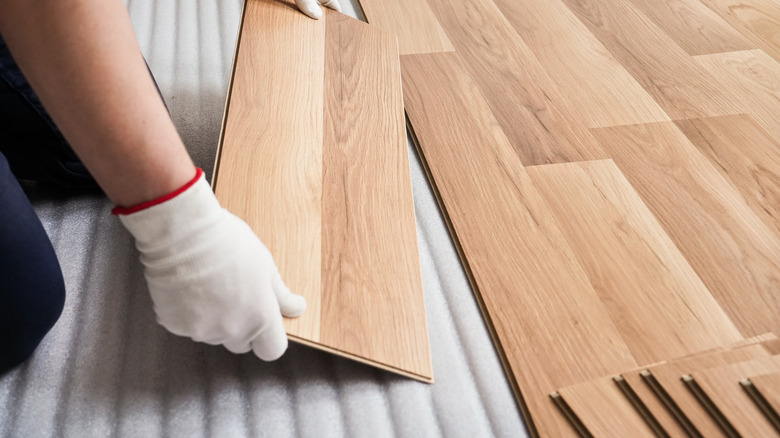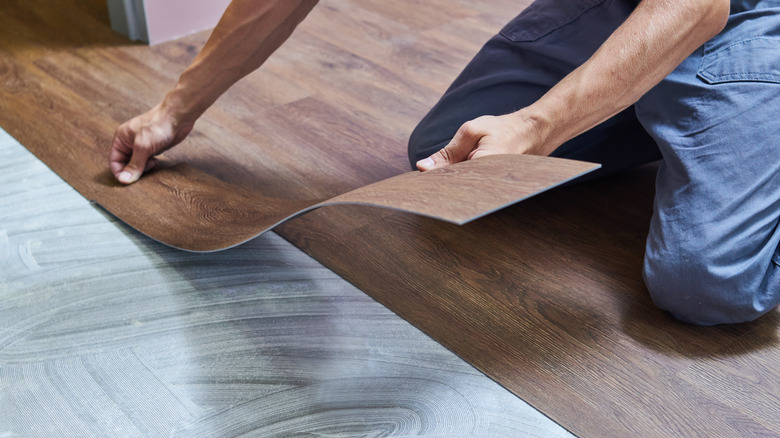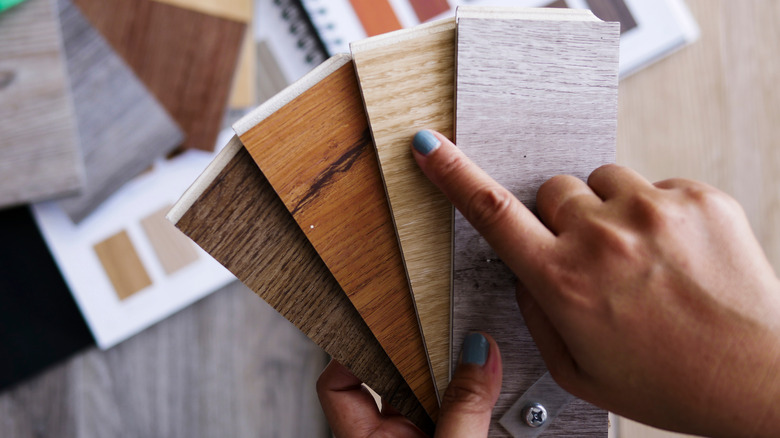Are Laminate Or Vinyl Floors Better For Your Budget In The Long Run?
If you're venturing into the world of flooring for the first time, you might think that vinyl and laminate flooring are the same. The two materials might seem like synonyms at first glance — simply referencing plastic-based flooring — but they're two very different things. While both options can mimic everything from wood to stone, they're manufactured differently. For instance, vinyl is completely made from plastic, whereas laminate has a High-Density Fiberboard core, which is made from tightly packed wood pieces. This makes vinyl more water-resistant than laminate, but it also makes laminate more cushioned than vinyl. Laminate is slightly more expensive, but which is better for your budget in the long run? The answer can be tricky, so we reached out to a construction professional to weigh in.
As it turns out, vinyl plank flooring gives you more bang for your buck. "Laminates have always been prone to swelling, breakage, scratches, and overall durability issues. Now, there are new brands of waterproof laminates coming out, but they're still not the ideal pick for most homes because of their high cost and low availability," Skylar Bartlett, owner of Kreer Construction, exclusively tells House Digest. This makes it difficult to upkeep, especially if you have an active household. "Whereas vinyl has a ton of affordable lines, can be a relatively straightforward installation, and in some cases can be replaced individually as needed should damage occur." Here is a deeper look into why vinyl is the better option.
Vinyl is much more water-resistant
Water is the natural enemy of flooring, no matter what it is made out of. From hardwood to natural stone to synthetic materials such as vinyl and laminate, too much contact with water can buckle and stain it. However, vinyl is more resistant to such damage than laminate. "The good thing about vinyl, though, is that you can take it up, and dry the floor, and put it back if the product is good quality. With a laminate, if it's wet and damaged, it's done," Skylar Bartlett exclusively tells House Digest. That's because laminate has the High-Density Fiberboard core, which moisture destroys. Because of this, vinyl is better for your budget because you can still salvage your original flooring rather than being forced to rip it out and start anew.
However, that doesn't mean vinyl is completely waterproof. "Be mindful that just because something is 'waterproof' doesn't mean it's flood or major leakproof, and your floor can still buckle," Bartlett warns. This means you should still clean up spills as soon as they happen and ensure you don't allow standing water to sit on the surface too long. However, you don't have to stress that your floors will become ruined every time you track in water with melted snow or a pet has an accident.
How to pick the best quality vinyl
As with other products, the type of vinyl flooring you choose will help determine how much bang for your buck you'll get. Choosing poor-quality planks because they're the cheapest on the market won't garner you as much longevity as choosing mid-price planks, such as luxury vinyl planks. "Laminates are pretty standard in terms of size, thickness, styles, etc., while vinyl has more options. However, there are so many types and qualities of vinyl flooring that you want to opt for something with a thick wear layer," Skylar Bartlett exclusively tells House Digest. This is the clear protective layer on top of the design layer. The thicker it is, the more wear and tear the vinyl can take before the pattern or color becomes affected. You can typically choose vinyl flooring with a thickness of 12 or 20 mils.
While waterproof vinyl options are also more durable, you don't necessarily need to splurge on them if you don't have to. "Pay attention to where you want to use the flooring so that you know whether you need something waterproof or can get away with a water-resistant option," Bartlett advises. This can help you save on cost without sacrificing quality since bedrooms and dining rooms likely won't need a waterproof floor. On the other hand, bathrooms and mudrooms can benefit from them. It's all about cutting where you can and embracing more luxury versions where you can't.


